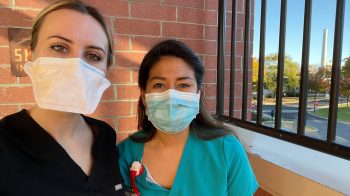Memories of misfortune
Share Now on:
Memories of misfortune
KAI RYSSDAL: Five years ago this month, hundreds of thousands of Argentinians took to the streets. Banging their pots and pans together to show their disapproval of the government’s economic policies. Argentina was facing a massive financial crisis. It had defaulted on a loan to the International Monetary Fund and tens of thousands lost their life savings when the peso was devalued. And countless more lost their livelihoods.
Rachel Hopkin brings us the story of two women — teachers living in Buenos Aires — and how they’re coping five years on.
XIMENA FARALLA: My name is Ximena Faralla and I’m 34 years old.
ANA-MARIA CABRERA: I’m Ana-Maria Cabrera. I’m 62 years old.
FARALLA: Before the crisis I was teaching English language and drama and literature. I was earning $2,000 a month.
CABRERA: Before the crisis I wrote novels. My first novel was the number one best seller novel. I live off the royalties. I live like I dream all my life, because I love to write.
FARALLA: The crisis was one of the worst things that happened to us. We had the dollar one-to-one and suddenly, from one day to the next, banks were all closed for four days and when they reopened the dollar was four to one. We couldn’t buy anything. We couldn’t do anything. And everything collapsed.
CABRERA: After the crisis, I went to the publisher. The editor told me “Sorry Ana, We love your books but we can’t publish them.”
FARALLA: Nobody wanted to take any private lessons and my income went from $2,000 to $350, and things in Argentina cost exactly the same or even more. So, if I . . . well, you do the math.
CABRERA: For almost one year, I have no job. They told me that I too old to teach. I couldn’t sleep. Since the crisis until today I take pills for depression. So, my life changed a lot.
FARALLA: I took advantage of the situation. I realized that people didn’t go to theater anymore, or didn’t go to the cinema, or didn’t want to go out of the house, not to spend any money. So I opened up my own theater company which goes to schools, which takes the theater to you, at a very low price taking just one show in English for children.
CABRERA: I work almost one hour and a half down in Buenos Aires. And I teach in a high school, really poor and really violent and they pay me 400 pesos a month, about $130.
FARALLA: At the beginning it was slow, but then 2003 it just took off. And then 2004 I had to drop teaching. I couldn’t cope with everything.
CABRERA: I’m working harder now than ever in my life. I have to teach and write articles and novels and papers and seminars and lectures and classes. It’s a lot.
FARALLA: My level of income is very high. I won’t tell you exactly. I don’t know. It depends on the month. I can earn from 10,000 pesos which is more than $3,000 or 15,000 pesos, yes, which is higher than what I earned before.
CABRERA: In January, everybody go out to holiday, but me no. It’s impossible. I have no money.
FARALLA: Even though I’ve done well since the crisis I honestly hate my country. You know, all the insecurity and all the dirt and . . . I don’t like living here.
CABRERA: I love my country. Here are my roots. Here, people have passion and people have energy. But it’s difficult to live here.
RYSSDAL: Rachel Hopkin produced that story for us.
There’s a lot happening in the world. Through it all, Marketplace is here for you.
You rely on Marketplace to break down the world’s events and tell you how it affects you in a fact-based, approachable way. We rely on your financial support to keep making that possible.
Your donation today powers the independent journalism that you rely on. For just $5/month, you can help sustain Marketplace so we can keep reporting on the things that matter to you.


















